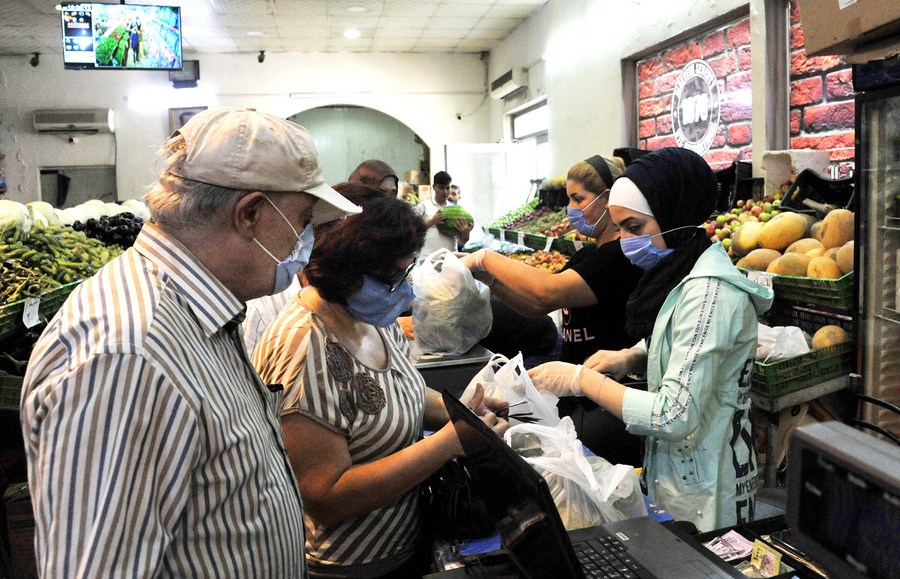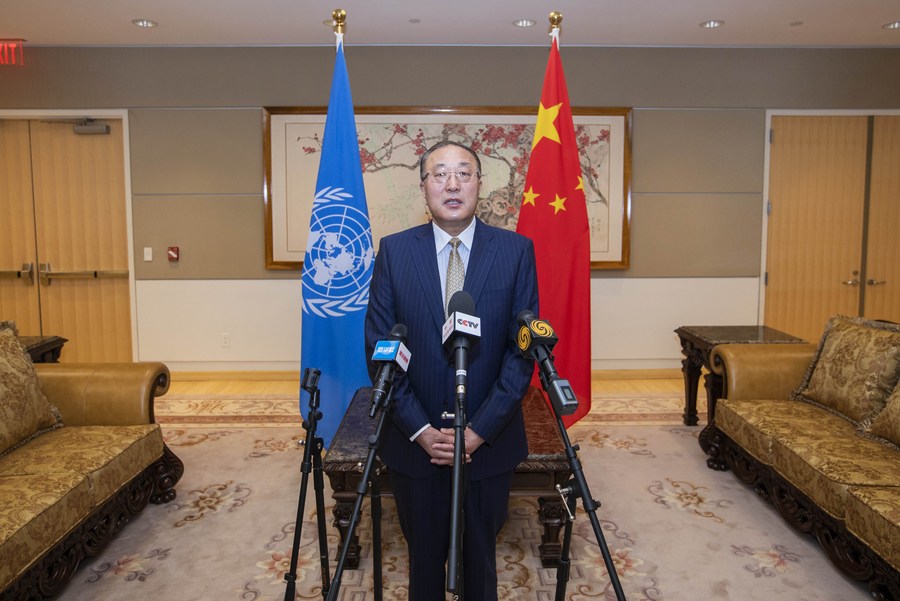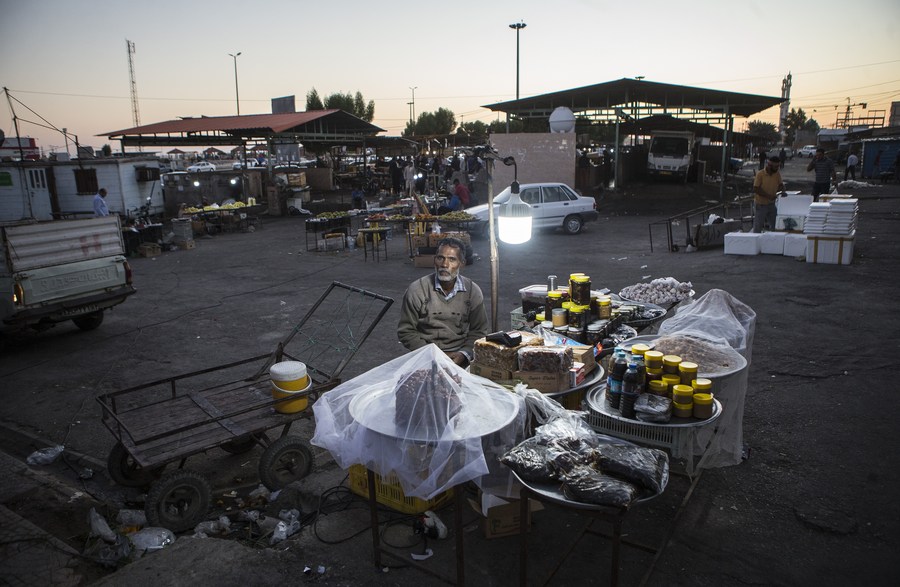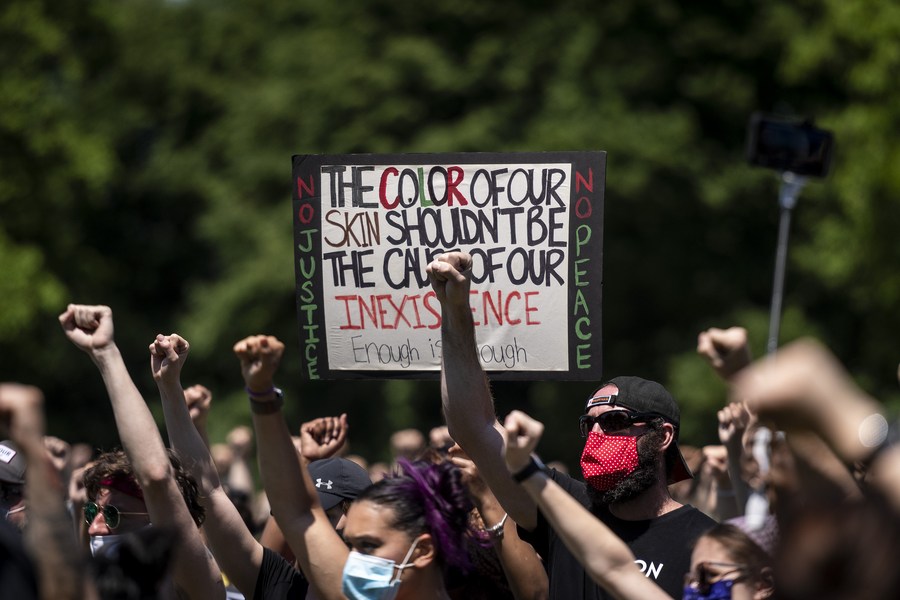
Syrians do shopping at a grocery store in Damascus, capital of Syria, on June 25, 2020. The United States has imposed new sanctions on Syria under the so-called Caesar Act, which was strongly condemned by Syria as targeting the livelihood of the Syrian people and their well-being. (Photo by Ammar Safarjalani/Xinhua)
"However, we continue to witness the application of unilateral coercive measures, which are contrary to the purpose and principles of the UN Charter and international law, multilateralism and the basic norms of international relations," said a Chinese envoy.
UNITED NATIONS, Oct. 5 (Xinhua) -- A Chinese envoy on Monday made a joint statement at the General Debate of the Third Committee of the UN General Assembly, on behalf of 26 countries, criticizing the United States and Western countries for violating human rights, calling for the complete and immediate lifting of unilateral sanctions, and expressing grave concern on systematic racial discrimination.
Zhang Jun, China's permanent representative to the United Nations, made the statement on behalf of Angola, Antigua and Barbuda, Belarus, Burundi, Cambodia, Cameroon, China, Cuba, the Democratic People's Republic of Korea, Equatorial Guinea, Eritrea, Iran, Laos, Myanmar, Namibia, Nicaragua, Pakistan, Palestine, Russia, Saint Vincent and the Grenadines, South Sudan, Sudan, Suriname, Syria, Venezuela, and Zimbabwe.
The COVID-19 pandemic continues to severely affect all nations, in particular developing countries. The response to and recovery from COVID-19 requires global solidarity and international cooperation. "However, we continue to witness the application of unilateral coercive measures, which are contrary to the purpose and principles of the UN Charter and international law, multilateralism and the basic norms of international relations," said Zhang.
Unilateral coercive measures have an undeniable impact on human rights, as they impede the full realization of social and economic development and hinder the well-being of the population in the affected countries, in particular women, children, including adolescents, the elderly and persons with disabilities, he said.

Zhang Jun, China's permanent representative to the United Nations, speaks during a press briefing in New York, Sept. 22, 2020. (Xinhua/Wang Ying)
Unilateral coercive measures undermine the right to health, as they encumber access to medicines and medical technologies, equipment, and supplies. "This is particularly relevant in the context of the COVID-19 pandemic. UN senior officials and the international community have recognized the heavy, negative impact of these measures," he said.
The statement welcomes the UN secretary-general's appeal of March 26, 2020, on the waiving of sanctions that undermine countries' capacity to respond to COVID-19, as well as the statement made by the UN High Commissioner for Human Rights on March 23 on the need to ease or suspend sectoral sanctions in light of their debilitating impact on the health sector and human rights. It also reaffirms the Group of 77 and China's statement calling for urgent and effective measures to eliminate the use of unilateral coercive economic measures against developing countries, as well as the Non-Aligned Movement's declaration on condemning unilateral coercive measures and urging their elimination to ensure the effectiveness of national responses to the COVID-19 pandemic.
The statement also welcomes the recently adopted General Assembly resolution on a comprehensive and coordinated response to COVID-19, which strongly urges states to refrain from promulgating and applying any unilateral economic, financial or trade measures not in accordance with international law and the UN Charter.

A vendor waits for customers at an old bazaar in port city of Bandar Abbas, Iran, Nov. 28, 2019. (Photo by Ahmad Halabisaz/Xinhua)
"We take note of the work on this issue of the Special Rapporteur on the Negative Impact of Unilateral Coercive Measures on the Enjoyment of Human Rights, other special procedures of the Human Rights Council and relevant human rights treaty bodies. We look forward to their further elaboration of this subject," said Zhang. "We seize this opportunity to call for the complete and immediate lifting of unilateral coercive measures, in order to ensure the full, effective and efficient response of all members of the international community to COVID-19."
Global solidarity and international cooperation are the most powerful weapons in fighting and overcoming COVID-19, he said.
Almost 20 years after the adoption of the Durban Declaration and Programme of Action, instances like the death of George Floyd and the shooting of Jacob Blake continue to take place, and vulnerable people continue to suffer or lose their lives to racism and police brutality. Such instances are a reminder that chronic and deep-rooted racial discrimination, police brutality and social inequality still exist. The COVID-19 mortality rate of minorities, in particular people of African descent, is disproportionately high in some countries, said Zhang.
"We also express our deep concern over the health situation of migrants at immigration detention centers in certain countries that reflects a contemporary form of racial discrimination," he said.

Demonstrators hold up fists during a protest over the death of George Floyd in Chicago, the United States, June 6, 2020. (Photo by Chris Dilts/Xinhua)
"We welcome the adoption of the Human Rights Council resolution 'The promotion and protection of the human rights and fundamental freedoms of Africans and of people of African descent against excessive use of force and other human rights violations by law enforcement officers,' and called for its full implementation."
The term "unilateral coercive measures" usually refers to economic measures taken by one state to compel a change in the policy of another state. Examples of such measures include trade sanctions in the form of embargoes and the interruption of financial and investment flows between sender and target countries. Unilateral coercive measures are contrary to the purpose and principles of the UN Charter and international law, and severely hamper the economic development and health capacity of affected countries, according to the statement.
In the context of the COVID-19 pandemic, the negative influences of unilateral coercive measures have drawn the attention of a large number of UN member states. Both UN Secretary-General Antonio Guterres and High Commissioner for Human Rights Michelle Bachelet called for the waiving of sanctions that undermine countries' capacity to respond to COVID-19. At the just concluded General Debate of the 75th session of the UN General Assembly, many leaders called for the lifting of unilateral coercive measures, the statement added. ■



